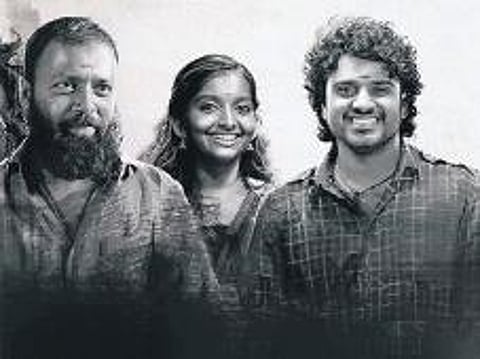

Vishnu Unnikrishnan and Bibin George are known for scripting a certain brand of commercial entertainers high on humour. But beneath all the fun moments will be a serious core idea—child abuse in Amar Akbar Anthony, body shaming in Kattappanayile Rithwik Roshan, and the effects of childhood trauma in Oru Yamandan Premakadha. When it comes to their directorial debut, Vedikettu, the core is caste.
Chithu (Bibin George) is madly in love with a girl from his neighbouring village, and to ensure he doesn’t lose her, he goes around quashing all her marriage alliances. This enrages the girl’s brother Shibuttan (Vishnu Unnikrishnan) and the villagers resulting in a series of clashes between the two sides. Now, this is a storyline that’s as generic as it can get, but what works for the film is the setting.
Vedikkettu is set in an island suburb, with much of the action happening in two settlements—Manjapra and Karankotta. The name of these places itself is an indicator of their deep-rooted caste identity. While Manjapra is inhabited by the Ezhavas, Karankotta is a Dalit village. The film’s opening visuals focus on a statue of social reformer Narayana Guru in Manjapra and his famous quote, ‘Oru Jaathi Oru Madham Oru Dheivam’ (one caste, one religion, one God).
Soon we are taken to the other side of the shore, where we see the statue of Ayyankali, a reformer who worked relentlessly for the betterment of Dalits. Over the last few years, there has been a strong anti-caste movement in Indian cinema, with filmmakers across languages daring to discuss caste and its malicious ways in society. Even amidst this surge, mainstream Malayalam cinema largely preferred to stay away. In that sense, Vedikkettu, in spite of all its shortcomings, is a welcome addition.
Aside from all the drama associated with the aforementioned love story, this film is a strong commentary on caste-based discrimination. There’s a scene in a police station where men from Manjapra and Karankotta are summoned for a compromise talk. After taking a favourable decision for the people of Karankotta, the cop, named Nambiar, casually asks them to fix the leaking toilet. When they refused to do it, whistles thundered in the theatre.
There are a couple of other similar scenes—one involving a KSEB employee refusing to drink water from Karankotta and another where a newly-appointed Dalit temple priest anguishes to the authorities, saying, ‘niyamanam ayittum anuvadham tharunna avaksaham ipozhum ningalude kayil analo’. It’s rare to see such a powerful critique on caste in mainstream Malayalam cinema.
It’s worth a mention that Vishnu and Bibin’s last film Oru Yamandan Premakadha was set in similar terrain too, but they faltered by casting someone like Dulquer Salmaan, who looked alien and had to try too hard to blend in. This time, thankfully, they got the representation part right by casting most of their actors from the locality. Their raw performances add a lot of authenticity to the film and its intentions. The makers have also put a lot of effort into detailing and accurately portraying the local culture.
Among the two leads, Bibin settles for a familiar guy-next-door role, whereas Vishnu gets a more dominant one. As the hot-headed Shibuttan, he makes a lasting impression. The actor, with his petite physique, has a commanding screen presence punching above his weight effortlessly. Buried inside Shibuttan’s burning anger is some severe agony of a broken heart, which he inadvertently lets out during a song sequence. It’s interesting that the makers chose to leave it as such without any further explanations.
A notable aspect of the Vishnu-Bibin duo’s previous films was how the comedy sequences get placed in the narrative like a comedy skit series where one random episode follows the other. There are a couple of such scenes in Vedikkettu, one of which forms the crucial interval block. It is a much-hyped sequence without a payoff, adding zero value to the narrative.
But when compared to their previous works, Vedikkettu is far more focused and gets the emotions soaring high towards the end. As the end credits roll, we learn that a real-life incident inspired the film. One cannot think but wonder how the writer-director duo made such a plot out of it. Commendable indeed.
Film: Vedikettu
Directors: Bibin George, Vishnu Unnikrsihnan
Cast: Bibin George, Vishnu Unnikrsihnan, Aiswarya
Rating: 3.5/5